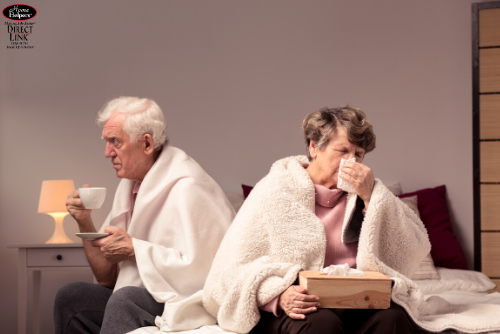We are right in the middle of Florida’s flu season, yet by the end of December 2019, FloridaHealth.gov had reported to the Centers for Disease Control and Prevention [CDC], that influenza was widespread across the state, with a higher number of cases having been reported by the last week of the decade, than in the two previous flu seasons during the same time period, 2017-2018, 2018-2019.
“Influenza, or flu, is a respiratory infection caused by a variety of influenza viruses. Most experts believe influenza viruses spread primarily by droplets made when infected people cough, sneeze, or talk. Less often, a person might become infected with influenza by touching a surface or object contaminated with influenza virus and then touching their own mouth, eyes, or nose,” according to FloridaHealth.gov.
Aging.com shared these statistics, “The CDC reports that between 70 and 85 percent of people who die from seasonal flu infections are over the age of 65, and that up to 70 percent of flu-related hospitalizations involve seniors.
With this in mind, my primary concern is providing help for seniors to protect them from influenza, because they are among the most vulnerable in terms of this nasty virus. Moreover, the complications that can develop as a result of the flu often render fatal consequences for the elderly.
Hopefully, these 10 tips will help seniors fight the flu:
- Get the most current flu vaccinations. Infectious Diseases Society of America and Oxford Academic says, “The flu shot is the most important senior flu prevention, with research showing that people aged 50 and older who got a flu vaccine reduced their risk of being hospitalized with flu by 57%.” It is important to remind family and friends to get their flu shots, as well, as an additional measure of protection.
- Stay current with all vaccinations, including the pneumococcal , or pneumonia, vaccine, meningitis, and other blood-borne infections. Should any of these conditions arise, nasty complications are likely to manifest as a result.
- Wash your hands frequently and thoroughly. An article in the Orlando Sentinel last month made a great point, “From gas pumps and escalator railings, to door knobs – germs are everywhere. Mailboxes, gas stations, door knobs…basically all are petri dishes.”
- Maintain healthy habits like eating right, exercising, and getting enough sleep. Additionally, you should always cover your mouth and nose with your inner elbow, handkerchief or tissue when coughing or sneezing.
- Sanitize mobile phones and devices with sanitizing wipes or alcohol pads, but be careful not to get electrical components wet.
- Avoid close contact with others who are sick. This should go without saying, but it is not always easy to do. People don’t always stay home when they’re sick, so be watchful, mindful and extra-careful when in public places, traveling, or around family and friends fraught with symptoms.
- Drink plenty of water, juices and hot tea to help nasal passages trap germs before they can spread throughout the body.
- Increase Vitamin C and protein intake to boost the body’s immune response and reduce the risk of contracting an illness.
- Clean your environment to reduce and eliminate germs by using a disinfectant, especially in kitchens and bathrooms. Do not neglect door knobs in your home and communal areas where family or coworkers gather, or objects like remote controls and shopping carts that get touched frequently.
- See your physician immediately if you experience flu-like symptoms. Your doctor will be able to troubleshoot indications of complications and prescribe anti-viral medications to help prevent them. Symptoms may include fatigue, fever, headache, coughing, sore throat, runny or stuffy nose, body aches, chills, and occasionally, stomach pains, vomiting and diarrhea.
FloridaHealth.gov reiterated, “The Centers for Disease Control and Prevention recommends antiviral treatment be initiated as soon as possible for people with confirmed or suspected influenza who are at higher risk for complications (children <2 years, adults ≥65 pregnant women, and people with underlying medical conditions). Treatment should be administered within 48 hours of illness onset. For more information, contact your health care provider.”< p>
I hope these 10 tips will protect seniors from contracting an influenza virus or other infectious diseases this season. If you or a senior friend or family member has a suppressed immune system or chronic health conditions that may require help with medication reminders, light housekeeping, meal preparation, transportation assistance to/from doctor’s appointments, or more, I offer a FREE consultation to assess and match the perfect, compassionate caregiver who will be happy to provide the assistance necessary.
We, at Home Helpers® Clearwater, are honored to have received the Home Care Pulse – Best of Home Care® Provider of Choice Award for 2017, 2018 & 2019. We proudly serve male and female seniors in Clearwater, Dunedin, Palm Harbor, Safety Harbor, Tarpon Springs, Holiday, New Port Richey, Trinity, Port Richey, Hudson and surrounding areas. Home Helpers®…we are Making Life Easier℠ (727) 240-3059
Sources:

